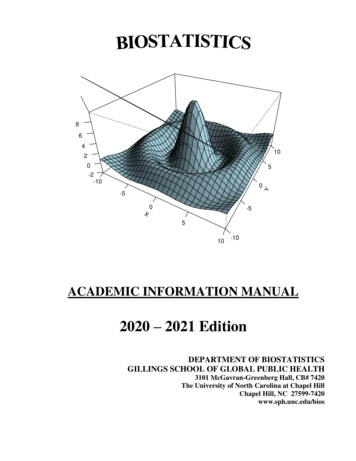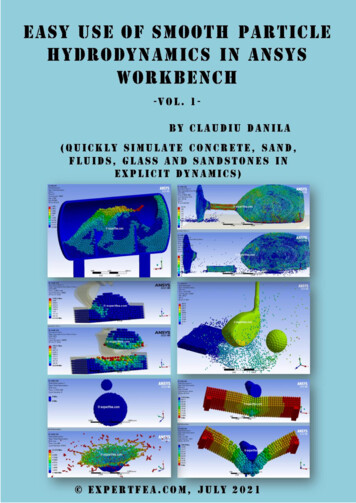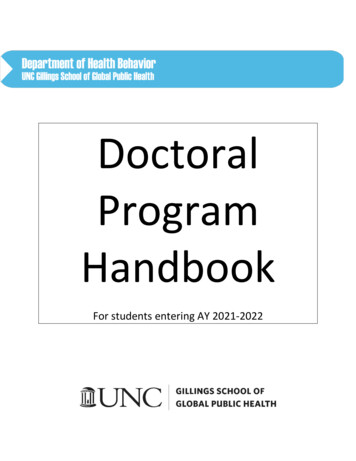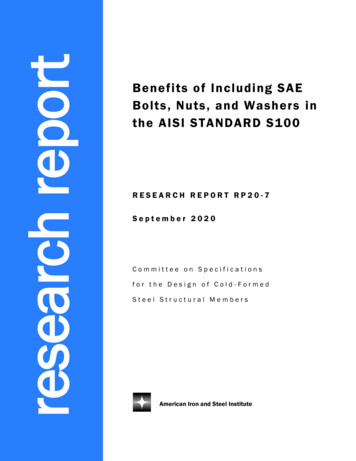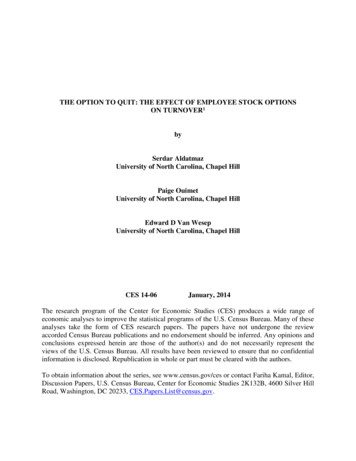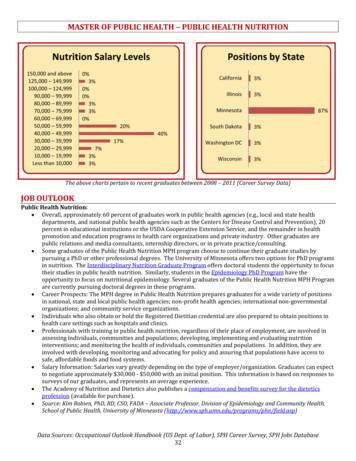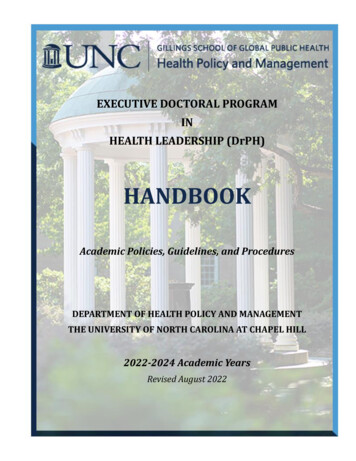
Transcription
EXECUTIVE DOCTORAL PROGRAMINHEALTH LEADERSHIP (DrPH)HANDBOOKAcademic Policies, Guidelines, and ProceduresDEPARTMENT OF HEALTH POLICY AND MANAGEMENTTHE UNIVERSITY OF NORTH CAROLINA AT CHAPEL HILL2022-2024 Academic YearsRevised August 2022
These Guidelines and Procedures describe rules, regulations,policies, and procedures for the Doctoral Program in HealthLeadership (DrPH), as established by the Department of HealthPolicy and Management and by the actions of the AdministrativeBoard of the Graduate School. Each student should become familiarwith the material pertaining to this program, and, together with afaculty advisor, make certain that the selected plan of study complieswith the pertinent requirements.In any instance of discrepancy between these guidelines and theGraduate School Handbook, the Graduate School Handbook takesprecedence. The Handbook is on the Web: http://handbook.unc.eduii
Table of ContentsTHE GILLINGS DRPH . 1GENERAL INFORMATION . 2Program Goal . 2Students . 2DrPH Program Governance . 2Program Director . 2Advisory Committee . 3Graduate School Handbook. 3Class Size . 3Program Costs . 3Financial Aid . 3Admission Requirements. 4DrPH Advising and Chairs of Dissertation . 4Program Design . 4DRPH DEGREE REQUIREMENTS . 7Competencies . 7Coursework. 7Practicum and Final Leadership Reflection. 8Final Leadership Reflection . 9Culminating Experiences . 9Written Comprehensive Examination . 9Dissertation . 9ACADEMIC PROGRESS POLICIES AND PROCEDURES . 20Policy on Repeating Course Enrollments. 20Reinstatement and Readmission Procedure for Graduate Students . 21Reinstatement Procedures . 21Readmission Procedures . 21CONDUCT REQUIREMENTS . 22Ethics and Honor Code . 22Harassment and Discrimination . 22Institutional Review Board (IRB) and Research Involving Human Subjects . 22iii
Conflict of Interest . 23HIPAA . 23FORMS . 25Required Forms . 251.Report of Preliminary Doctoral Written Examination. 252.Report of Doctoral Committee Composition. 263.Report of Approved Dissertation Project . 264.Report of Oral Examination . 265.IRB Approval. 266.Application for Graduation . 267.Report of the Final Oral Examination . 26Additional Forms . 27Change of Advisor Request . 27GRADUATION . 28Submission of Final Dissertation to Graduate School. 28Appendix A: Degree Specific Competencies . 29APPENDIX B: Academic Schedule and Course Sequence: 2022-2024 (Cohort 18) . 34APPENDIX C: Academic Schedule and Course Sequence: 2022-2023 (Cohort 17) . 36APPENDIX D: Degree Requirements Checklist (Cohorts 17, 18) . 37iv
THE GILLINGS DRPH1
GENERAL INFORMATIONProgram GoalThe goal of this DrPH program is to accelerate the learning, knowledge, and skillacquisition of highly motivated, mid- to senior-level leaders committed to improvingthe public’s health such that they can maximize their positive leadership impact in their respectiveorganizations, their field, and across the broader systems that influence good health and wellness.StudentsThe program is designed for mid-to-senior level professionals working at that level at least five yearsand having completed a graduate degree at least five years prior to enrollment. They should beworking full-time with the potential, ambition, and drive to become more influential health leaders.Work examples include, but are not limited to, local, state, tribal, territorial, international healthofficials; managers in government agencies; leaders within nonprofit, for-profit and nongovernmental organizations; program officers and other managers working for foundations; as wellas others working within the health field, which may include entrepreneurs and individuals working innontraditional settings affecting the health of the public.The DrPH program is focused on developing leaders who will improve the public’s health in theUnited States and/or globally. This leadership focused doctoral program and its curriculum isrelevant to people who work domestically and internationally. While most students are from the US,many students work and live overseas. Because graduates will lead applied efforts to improve thepublic’s health, cohorts do not include individuals who intend to focus predominantly on research oraspire to academic teaching positions.DrPH Program GovernanceAll responsibility for the academic conduct, standards, and requirements of the doctoral program restswith the faculty of the Department of Health Policy and Management (HPM) through its duly appointedand elected officers and representatives, in accordance with other school and university policies.Program DirectorThe director of the DrPH program is responsible for all administrative affairs of the program,including administration of academic conduct, standards, and requirements. In addition, thedirector is responsible for recommending admissions and financial support, matching dissertationchairs with the student, approving DrPH dissertation committee chairs and members, advisingthese committees on interpretation of policies and requirements, ruling on all petitions inaccordance with School of Public Health and Graduate School guidelines, and fulfilling any otheradministrative duties or responsibilities delegated by the Department Chair.Director:John Wiesman, DrPH, MPHProfessorDirector, Executive Doctoral Program in Health LeadershipDepartment of Health Policy and ManagementJohn.Wiesman@unc.edu2
Advisory CommitteeThe DrPH Advisory Committee advises the director about all issues related to the DrPH program(e.g., admissions, curriculum, policy). In addition to Dr. Wiesman, the members, as of July 2022,are:Joe Barker, MPH (DrPH Cohort 14)Emilee Coulter-Thompson, LMSW (DrPH Cohort 15)Sandra B. Greene, DrPH (DrPH Faulty)Susan Helm-Murtagh, DrPH, MM (DrPH Cohort 2 and DrPH Faculty)Tyonne Hinson, DrPH, MSN, RN, NE-BC (DrPH Cohort 9; Adjunct Faculty)Thomas C. (Tom) Ricketts, PhD (Faculty)Mayra Serrano, MPH (DrPH Cohort 14)Pam Silberman, JD, DrPH (Faculty)Rebecca Slifkin, PhD (Faculty)Stephanie Watson-Grant, DrPH (DrPH Cohort 7; Adjunct Faculty)Ciara Zachary, PhD, MPH (Faculty)Graduate School HandbookAdditional information on the governance of and regulations for doctoral study are contained inthe Graduate School Handbook. Students are responsible for being familiar with its contents,and complying with rules, regulations, policies, procedures, and deadlines. The core regulationshave been incorporated in part in these Guidelines and Procedures, but additional, essentialregulations are given only in the Graduate School Handbook. In instances of discrepancybetween these Guidelines and Procedures and the Graduate School Handbook, the GraduateSchool Handbook takes precedence.Class SizeTypically, fifteen students are admitted annually.Program CostsTuition and fee costs vary year to year for in state and out-of-state students. Students pay per credithour and take approximately 18 credit hours in each of years 1 and 2. In the following years,students generally take between 6-15 credit hours to finish their dissertation. In addition to tuitionand the cost of books, students must provide their own computers and web cams per programspecifications (information is provided to students separately and updated as necessary as thetechnology changes). Students will also be responsible for travel, lodging, and food expensesrelated to three annual visits to campus (or an alternate location) in each of the first two years.Financial AidMost students fund the program themselves (self-funded with or without educational loans) or withemployer contributions. There are very limited school awards available for this program, and the3
maximum usually does not exceed 5,000 in any given year. It is important that prospective studentshave a funding plan in place when considering application.UNC Scholarships and Student Aid has information on financial assistance and fellowships. Whenseeking out these resources, please note the DrPH program credit hours often do not meet full-timestatus and as a primarily distance program, resources for residential students do not apply.The University does have special military tuition benefits.As a state school, there are certain requirements to be met for in-state residency and studentsshould be aware of those when they apply and register for classes.Admission Requirements A prior master's or doctoral degree (not necessarily in public health) earned at least fiveyears prior to enrollment.Significant post-graduate experience in the health field, including at least five years in a midto-senior level leadership position, preferably with substantial management and leadershipresponsibility.Demonstrated potential, with motivation to obtain senior-level positions and passion toimprove the public’s health.Grade Point Average (GPA) of 3.0 or better in prior graduate study.While all students are expected to be academically qualified for doctoral level study, specialemphasis is placed on work history, demonstrated leadership, and a practice-oriented careercommitment.Also note: Students without a Master of Public Health (MPH) or Master of Science in Public Health(MSPH) from an accredited school of public health must successfully complete an additional threecredit foundational learning objective course (which is offered online). This course (SPHG 600) neednot be completed before matriculating, but it must be completed before graduation; most studentstake the course in the summer prior to their first fall semesterDrPH Advising and Chairs of DissertationThe program director serves as the faculty advisor for the program, guides the students ininterpreting course and program requirements, and helps to identify potential dissertation chairs.Students generally identify dissertation chairs in the late spring or summer of their first year, basedon mutual scholarly and practice interests (see more about the dissertation process below). Thechair will assist the student in their dissertation research and help identify other dissertationcommittee members. In addition, the HPM academic coordinator is available to work with studentson general program matters and course registration issues.Program DesignIn each of the first two years, students come to Chapel Hill for five days in mid-August, between falland spring semesters (early January, usually the week of New Year’s Day), and between spring andsummer semesters (mid-May, usually right after Mother’s Day/spring commencement). Note thattravel may be required on these two holidays. At times, an alternate site may be chosen, which mayrequire travel outside the U.S. or North Carolina. The program has historically gone to London everyother year in May with a planned on-site there in May 2023. Students are given ample time to make4
travel arrangements in these cases. Otherwise, learning takes place away from the UNC campus.Students connect to faculty and peers mainly via computer.The DrPH program is a year-round program. In the first two years, students have class almost everyweek of the year (including summers), except for about three weeks in December.We make substantial use of technologies (Zoom and Sakai/Canvas) that allow students and facultyto interact productively and that support live video, audio, and data sharing. The technologies canalso be used to connect guest speakers with students without having to bring everyone together inthe same room. NOTE: Students must have a reliable DSL or cable Internet connection. Dialup connections will not work with our technology. It is recommended that students useheadsets or earbuds if they choose to connect to class audio using their computers,especially if they will be in a noisy environment during class. Connecting via phone is also anoption, but it is recommended that international users connect via computer audio to avoidunexpected phone charges.Windows-based PCs are preferred, but not required, as technical support from our department ismore readily available for these machines and they work most reliably with our current applicationsand with the University’s on-campus wireless service. Laptops with a minimum 13-inch screen sizeare recommended over tablets. Our online classes frequently feature slide presentations and screensharing of specific applications, which can be difficult or impossible to see well on small screens. Inaddition, machines with Windows 10 and 11 operating systems should have the Microsoft Edge andMozilla Firefox Internet browsers installed. Apple machines should have Firefox and Safari browsersinstalled.The executive format functions as follows: During their first visit in August, students begin theirstudies with a week on campus during which they are oriented to the program, the Department,School, and the University. They are introduced to the first semester curriculum and are trained inusing the software and library resources. The students then return home for the balance of thesemester.Students receive material (recorded videos, narrative case studies, datasets, readings, etc.) via theWeb each week. They study these materials on their own but must have completed required tasksbefore a regularly scheduled class session when they will convene live via Internet video. Thesethree-hour synchronous learning sessions are divided into the components of the curriculum and ledby faculty members responsible for each component, sometimes including guest speakers.First-year students meet for class on Tuesdays; second-year students meet for class onWednesdays. Class times typically are 4-7pm Eastern Time.Students return to Chapel Hill between semesters to conclude work on the preceding semester andbegin work on the next semester's curriculum. This process is repeated throughout the first twoyears of the curriculum. All students move through the curriculum together at the same pace. EveryDrPH course in the first two years is required of every student. Some students are experts on someof the subject matter taught in courses. Nonetheless, every student must take all the same courses.We want students to share their expertise with others in the cohort. We believe active interactionamong students is an important part of good adult learning.5
The focus in the third year is on writing the dissertation, although students are also free to takeelectives. We expect students to do their best to proceed through the program with their cohort andto defend their dissertation within five years of matriculation. At the discretion of the program directorand dissertation chair, that time frame may be extended, but in no event will students be permitted toextend their time more than eight years from matriculation.Note that participation in the doctoral program requires attendance at six on-campus sessions duringyears 1 and 2 of the program. (It is possible that not more than once each year, the on-campus visitwill take place in a location outside Chapel Hill, including elsewhere in the U.S. or abroad.)Exceptions will be made only in the case of 1) illness or death in the family, or 2) mandatoryorganizational obligation (one time only), acknowledged in writing by employer. We understand thatimportant professional and personal opportunities may conflict with scheduled on-campussessions. However, priority must be given to attendance at on-campus sessions. Only in rarecases will other extraordinary circumstances be considered by the program director.Similarly, on-time attendance is required at all weekly class sessions throughout years 1 and 2 of theprogram. Students are expected to arrange vacation and work-related travel plans to accommodateclass session times. Failure to attend class sessions and/or on-campus (or scheduled off-site, inperson sessions held at alternative sites) as specified or chronic tardiness for class sessions willdisqualify a student from continuation in the program. Classes are set up in sequence and each isoffered only once a year. Therefore, if a student does not complete a class on schedule, they willhave to wait one year before the course is offered again.6
DRPH DEGREE REQUIREMENTSCompetenciesThe UNC Doctoral Program in Health Leadership is designed to give studentscertain competencies through their coursework and the completion of theirdissertation. Competencies define what students should know and be able to doupon completion of their degree program. Competencies guide our curriculum planning process andserve as a measure against which student achievement is assessed. The competencies offered inthis program include foundational DrPH competencies identified by the Council on Education forPublic Health (CEPH), and additional competencies designed to impart the skills and knowledgeneeded for a leadership concentration. These later competencies were identified by members of theDrPH Advisory Committee and feedback from past cohorts. Please refer to the competency matrix(Appendix A) to review the learning experiences through which students in the DrPH develop andattain these competencies.CourseworkThe program curriculum is summarized in the table below and in Appendix B for first year studentsand Appendix C for second year students. A checklist for degree requirements is included inAppendix D. Students in this degree program must also demonstrate core public healthcompetencies, as described in the Gillings Schoolwide Handbook.DOCTORAL PROGRAM IN HEALTH LEADERSHIP (DrPH) CURRICULUMCONTENT AREAS(Credit hours in parentheses)LEADERSHIPPUBLIC HEALTHHPM 820: OrganizationalLeadership Theory and Practice (2)HPM 860: PopulationPerspectives for Health (2)***RESEARCH*Year 1FallHPM 810: Leadership in PublicHealth Law and Ethics (2)**HPM 970: Training and Pedagogyfor Health Leaders (1)SpringHPM 965: Cultural Humility for 21stCentury Health Leaders (1)**HPM 966: Systems Thinking& Collective Impact (1)HPM 953: Essentials ofPractice-based Research (2)**HPM 951: Literature Review& Appraisal (2)HPM 823: Global Health (1)**SummerHPM 963: Program Evaluation(2)***HPM 969: Program Planningand Design (1)HPM 945: DissertationPreparation and Planning I(2)7
LEADERSHIPPUBLIC HEALTHRESEARCH*Year 2FallHPM 958: Financial Leadership (3)HPM 964: ImplementationScience (1)SpringHPM 957: Crisis Leadership (1)HPM 759: Health PolicyAnalysis and Advocacy forHealth Leaders (2)****HPM 959: Strategic Planning forPublic and Nonprofit Organizations(2)SummerHPM 962: Marketing & PublicRelations for Health Leaders (2)HPM 956: Fundamentals ofResearch Methods andAnalysis (3)HPM 967: QualityImprovement (1)HPM 940: Leadership inHealth Informatics (1)****HPM 968: Managing the HealthcareWorkforce (1)Year 3FallHPM 994: DoctoralDissertation (3)SpringHPM 994: DoctoralDissertation (3)SummerHPM 994: DoctoralDissertation (3)* First year research courses help with dissertation proposal preparation. Second year courses focus onconducting the dissertation.** Also under “Public Health.”*** Also under “Research.”**** Also under “Leadership.”Practicum and Final Leadership ReflectionDrPH students are expected to engage in one or more applied practice experiences in which theymust complete at least one project that is meaningful for an organization and that advances publichealth practice. The practicum provides students an opportunity to apply the knowledge and skillsbeing acquired through their coursework and further develop and demonstrate attainment ofprogram competencies. Relevant organizations include governmental, non-governmental, non-profit,industrial, or for-profit settings, and may be the student’s own work setting. The work product may bea single project or a set of related projects that demonstrate depth of competence. It may be adiscrete experience or integrated into program coursework.The practicum must be approved, in advance, by the program director, and must cover between fiveto seven foundation and/or concentration-specific competencies. At least one must be from theleadership, management, and governance domain or from the unique to UNC DrPH programcompetencies domain found in Appendix A. In addition to the practicum deliverable, a separatepracticum reflection paper is required.Students can identify projects in classes to meet their practicum requirement, if the project identifiedis an application of the classroom learning to a “real world” setting (including the student’s worksite,or for another external organization). Alternatively, students can design their own practicum notdirectly tied to any specific class if the practicum meets the other requirements.8
Final Leadership ReflectionStudents are required to write a separate leadership reflection paper at the end of their secondsummer to describe how their leadership framework has changed over the two years of DrPHcoursework. As this is a leadership focused doctoral programs, students begin their coursework bydeveloping their personal leadership framework (fall, year 1 in HPM 820), and complete theirprogram coursework by reflecting on how their leadership framework has evolved over time.Culminating ExperiencesThe DrPH program requires two culminating experiences: the successful completion of a writtencomprehensive exam and a dissertation.Written Comprehensive ExaminationA written comprehensive examination is administered at the end of the second year of theprogram, usually in late August. The examination integrates key concepts from the overallprogram curriculum.Students have two 12-hour time periods over two days in which to take the exam. Specificdetails about the examination are provided to students at least one week before the exam isscheduled to take place and the process is discussed at the beginning of the summersemester before the examination. Note that this and all other examinations are given underthe University Honor Code.Students are expected to read, understand, and follow the policies set forth in the Instrumentof Student Judicial Governance. A Department-specific policy governing the comprehensiveexam is contained in a separate document available from the HPM academic coordinator.DissertationThe DrPH dissertation is the ultimate academic test of a student’s competency. It requiresthe student to apply key aspects of the curriculum to improving the understanding of orresolving an important public health-related issue.The dissertation should demonstrate the candidate’s mastery of the skills and knowledgerequired to address an important health-related program or problem or to create a substantialchange in policy for the public’s health. The dissertation should be of publishable quality ineither the scholarly literature or applied literature in health care delivery or public health.Students are strongly encouraged to publish their research, which is usually done afterdefending their dissertation, so the field can benefit from the research and its findings.Students must register for dissertation credits (HPM 994 for 3 credits) each fall and springsemester after they complete their coursework, until they defend their final dissertation.Students need at least two semesters of HPM 994 to graduate (6 credits). Students do notneed to register for HPM 994 in the summer unless they plan on defending their proposal orfinal dissertation in the summer session.Dissertation CommitteeStudents must have a five-member dissertation committee. The chair must be a faculty member in HPM AND be either a “Regular Graduate”(AKA: tenure track) professor OR a professor with “Special Appointment”. To seewho qualifies, go to the graduate school faculty designation page and search thename of your potential faculty chair in the “List of regular graduate faculty” and “Listof special appointed regular graduate faculty.”9
Two additional members MUST be from the Gillings School of Global Public HealthAND be either a “Regular Graduate” (AKA: tenure track) professor OR a professorwith “Special Appointment”. To see who qualifies, go to the graduate school facultydesignation page and search the name of your potential faculty committee memberin the “List of regular graduate faculty” and “List of special appointed regulargraduate faculty.”The remaining two committee members may be from anywhere in the University, anotheruniversity, in a field of practice relevant to your dissertation, or your place of employment (butcan’t have a conflict of interest). We DO encourage that you get people from the “field” whoknow your topic, who can assist you in recruitment of subjects, and who can help youformulate and implement your plan for change. These outside practitioners must beapproved by the program director and the graduate school. If approved, the graduate schoolwill appoint the practitioners as fixed term graduate faculty for purposes of participating on adissertation. Generally, the outside practitioners need to have a terminal degree (highestdegree in their field), although exceptions can be made when the person is uniquely qualifiedto serve on the committee. To have these outside practitioners approved, send an email tothe dissertation chair, program director, and academic coordinator along with aresume/cv/biographical s
EXECUTIVE DOCTORAL PROGRAM IN HEALTH LEADERSHIP (DrPH) HANDBOOK . Students pay per credit hour and take approximately 18 credit hours in each of years 1 and 2. In the following years, . and with the University's on-campus wireless service. Laptops with a minimum 13-inch screen size

